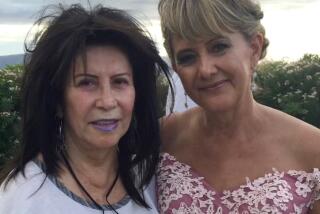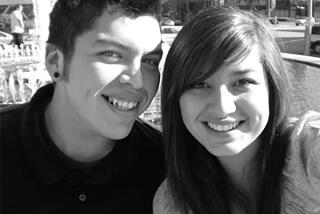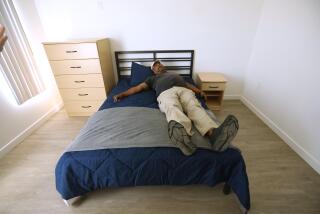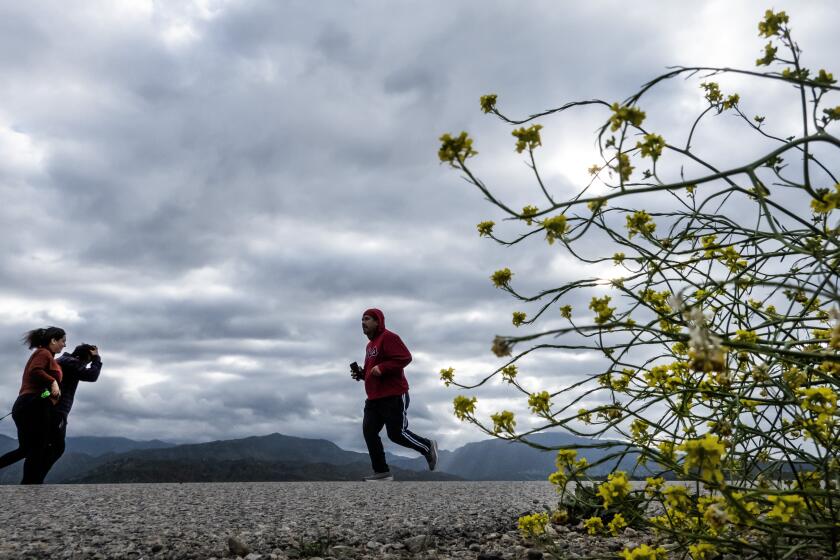Man who found a deep sense of purpose in Occupy L.A. is mourned
Alex Weinschenker was born 23 years ago last month.
He was his parents’ only child, and he was beautiful.
He had a sparkle in his eye and as a small boy in Hancock Park, he loved reading “The Lorax” and “The Phantom Tollbooth,” and making three-dimensional cities out of paper and tape.
He was so smart, but different. He did not go with the flow.
Less than one year into UC Santa Cruz, he declared himself done with formal education.
“You’re always taking the hard road,” said his father, Greg, to which he replied, “No, I’m taking the road less traveled.”
Last fall, though, he seemed to find his center in a sea of tents surrounding Los Angeles City Hall. He spent his days there silk-screening slogans onto bandannas and T-shirts.
When Alex died suddenly last week, probably from a relapse of a drug problem he’d tried to put behind him, his Occupy L.A. friends reached out to his family by birth, which in turn embraced his recent family by choice.
On Friday afternoon, grief at his death mobilized hundreds of his fellow occupiers to come to Forest Lawn Hollywood Hills, mostly on bikes and crowded into cars.
The Church of the Hills overflowed, and T-shirts, high-tops and piercings far outnumbered dresses, pumps and ties.
Longtime family friends talking about childhood T-ball and camping trips took turns at the microphone with new friends talking revolution.
Elise Whitaker, 21, said she was deeply moved by the generosity of Alex’s parents, especially to those he had known — however intensely — for only five months. “It’s really beautiful that they understand that this was a huge part of his life ... and it’s really good to share a celebration of his life together.”
His parents said it was natural, given how much the movement meant to Alex. “It was the turning point of his life,” said his father, an advertising creative director. “I was very, very proud of him,” said his mother, Carol, an interior designer.
Alex arrived at Occupy L.A. before the first tent when up. He was one of those arrested on the night police took the last tents down.
In between, he worked at the People’s Print Lab, where he printed 99% onto hundreds of bandannas, just like the one worn by Sarah Mason, whose image Time magazine used for its Person of the Year, “The Protester.”
He was very interested in graphic art and created many of his own designs. He also became a trusted Occupy leader, albeit in a leaderless society.
In the church, people watched a video clip of him training his peers to resist arrest.
At the Occupy camp, he wore his unwashed hair in a bun and his clothes splattered with ink.
“He, even more than the rest of us, would sometimes look like a dirty hippie,” said Whitaker. “But when it came to talking, he was so articulate and so sure of his message.”
He was a vegan and told her he did not eat honey because it exploited the work of the bees.
Kat Knox-Davies, 22, talked to him every day as they worked side by side in the print lab. She said he was “against the competitive nature of society” and believed “that we should work together, that if somebody wins it’s all for naught, we all have to be OK.”
The Weinschenkers, who separated about four years ago, say their son always worried about others. As a boy, he would ask to stop and help anyone who looked to be in need.
They say they trusted his good nature and tried to give him space to find how to put it to good use.
Lately, they’d thought he was doing so, if very much on his own terms.
Last year, Alex became a father to his own baby boy, Rivers, now 7 months old. He was no longer romantically involved with the child’s mother, but he was committed to taking care of both of them.
His commitment to the Occupy cause impressed his parents too, even if it sometimes seemed amorphous.
Alex was a natural debater, says his father. He had shelves full of books — Ernest Hemingway, John Steinbeck, Hunter Thompson, William Blake. He read constantly and absorbed everything.
Often, when Alex was younger, he and his father would stay up all night, arguing.
More recently, they debated the goals of Occupy L.A., some of which Greg told his son were naive.
“And he said, ‘Well, how do you know that? You have to try.’ ”
Occupy L.A. had filled Alex Weinschenker with energy and optimism, which makes the timing of his death even sadder, said his father.
“We were his first family. They were his last family. And they were a wonderful family to him.”
More to Read
Start your day right
Sign up for Essential California for news, features and recommendations from the L.A. Times and beyond in your inbox six days a week.
You may occasionally receive promotional content from the Los Angeles Times.







